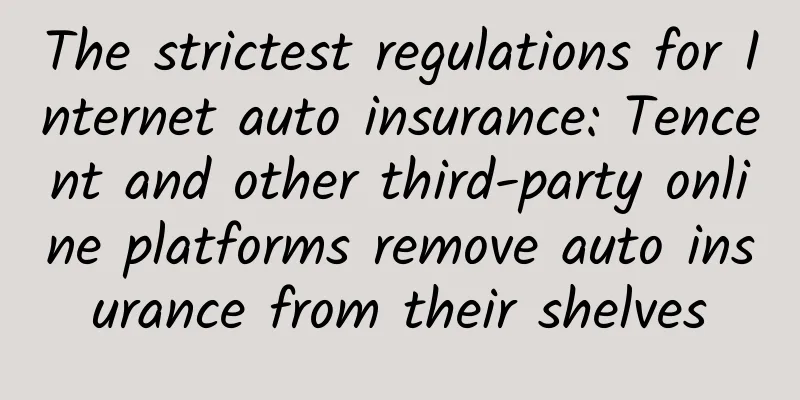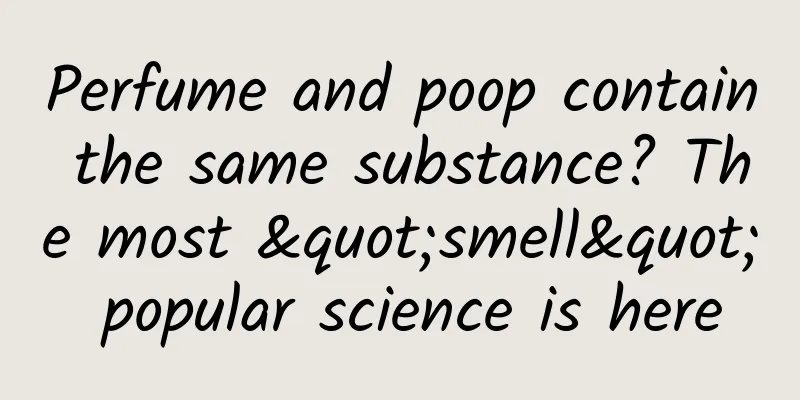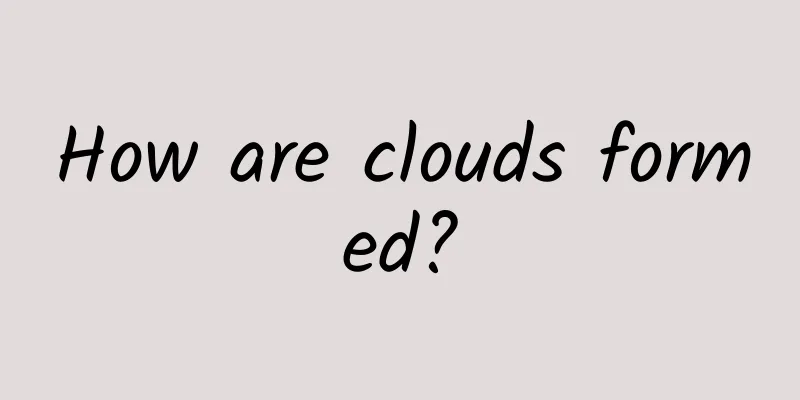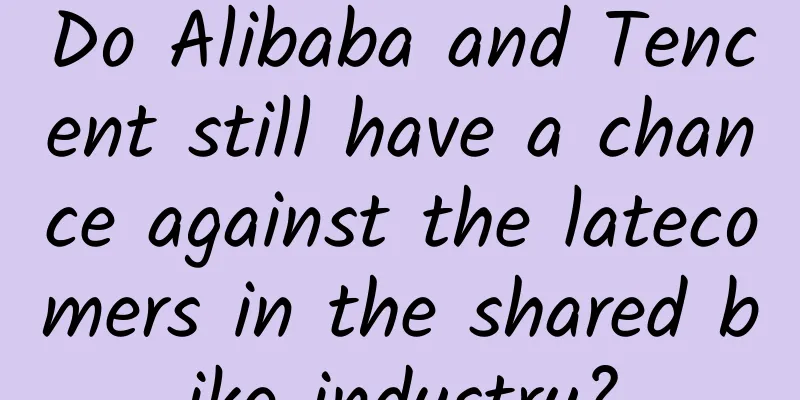The strictest regulations for Internet auto insurance: Tencent and other third-party online platforms remove auto insurance from their shelves

|
As the second commercial vehicle insurance premium reform is about to be implemented, the "Notice of the China Insurance Regulatory Commission on Rectifying the Chaos in the Motor Vehicle Insurance Market (Draft for Comments)" (hereinafter referred to as the "Notice") has been circulating in the industry, and the field of Internet auto insurance has already been in a state of panic. Now that the official "Notice" has been issued, it is even more radical than the draft for comments, and the field of Internet auto insurance is even more confused. In the draft for comments, the regulator intends to stipulate: If the services provided by third-party online platforms exceed the scope of technical support and auxiliary services, and actually carry out motor insurance sales activities or charge fees to property insurance companies based on motor insurance sales revenue, number of policies sold, etc., they should obtain the qualifications to engage in insurance business. In the official "Notice", it is clearly stated: Property insurance companies may entrust third-party online platforms to provide web link services, but they may not entrust or allow third-party online platforms that do not have the legal qualifications of insurance intermediaries to carry out insurance sales activities such as premium calculations, quotation comparisons, business promotion, and fund payments on their websites. The detailed regulations almost block all possibilities of "flexibility" and can be regarded as the strictest regulations in history for Internet auto insurance. Third-party online platforms can only choose to avoid the limelight, go into hibernation, or even simply remove auto insurance products from the shelves. The storm is brewing and a rectification storm is about to begin. How should the people on the stage survive? The auto insurance market is under regulatory supervision, and third-party online platforms are in hibernation The "Notice" was officially issued, and the hammer finally dropped. After the release of the draft for comments, the industry's various speculations that the CIRC would strictly regulate Internet auto insurance were confirmed one by one. Compared with the draft for comments, the officially issued "Notice" is even more stringent, blocking all possible "workarounds." The provisions of the Notice regarding the operation of auto insurance business by third-party online platforms are as follows: All property insurance companies should strengthen compliance control over auto insurance intermediary business and fulfill their authorization and management responsibilities for intermediary institutions and individuals. They shall not entrust institutions that have not obtained legal qualifications to engage in insurance sales activities, and shall not pay or pay auto insurance fees in disguise to institutions that do not have legal qualifications. They shall not entrust or allow cooperative intermediary institutions to transfer auto insurance agency rights to other institutions. All property insurance companies should strengthen compliance control over the auto insurance business of third-party online platforms. Property insurance companies can entrust third-party online platforms to provide web link services, but they may not entrust or allow third-party online platforms that do not have the legal qualifications of insurance intermediaries to carry out insurance sales activities such as premium calculations, price comparisons, business promotion, and fund payments on their websites. This means that third-party online platforms that do not have insurance intermediary qualifications cannot conduct business activities such as premium calculation, quotation comparison, business promotion, and fund payment on their websites. At most, they can only provide web link services. However, for now, the above methods are almost the main ways for third-party online platforms to engage in auto insurance business. The last glimmer of fantasy in the hearts of Internet auto insurance practitioners has also been shattered. Although it is midsummer, for them, winter has already arrived. "In fact, the development of Internet auto insurance should be encouraged." said a person working in a third-party online platform. He jumped into the Internet insurance circle from the technology circle with great expectations, but found that many things were a bit confusing, "because Internet auto insurance often starts from the customer experience and hopes to seek benefits for customers." Although they were reluctant, most platforms chose to comply with the regulations. Most unlicensed platforms have consciously carried out "rectification", and most auto insurance products have returned to full price, and some platforms have even removed auto insurance from their shelves. For example, Tencent's auto insurance platform still supports quotes and price comparison services from multiple companies, but further clicks do not display the page. In fact, this is not the first time that the Internet auto insurance industry has suffered a blow. Since the implementation of a new round of commercial vehicle fee reform in June 2015, the 15% channel discount space for online sales channels has been eliminated, and its premium income has declined significantly. Data shows that in 2016, the industry achieved a total of 39.894 billion yuan in online auto insurance premiums, a year-on-year decrease of nearly 44.29%. Although the "Notice" explicitly targets third-party online platforms that do not have the legal qualifications to act as insurance intermediaries, many major traffic users are among them, including Alipay and many Internet auto insurance startup platforms. The negative impact on Internet auto insurance premium income can be imagined. The embarrassment of Internet auto insurance: born in the wave of "Internet +", died in the competition of costs Since the concept of "Internet insurance" emerged, a large number of entrepreneurs have poured into the field of auto insurance. As a standardized insurance product that is closely related to people's lives, has a large enough scale and is used frequently, auto insurance is almost the most suitable insurance product for sale through the Internet among all insurance products. More importantly, through auto insurance, companies can reach the vast majority of China's middle- and high-end consumers - this is what Internet companies are most interested in. The entrepreneurial wave of "Internet +" has swept across various industries, and Internet auto insurance entrepreneurial platforms have continued to emerge. They have launched online quotation comparison services, cooperated with insurance companies to develop innovative auto insurance products, and actively introduced advanced technologies including blockchain and artificial intelligence, which has stimulated huge imagination space for Internet auto insurance and also aroused great interest among investors. In recent years, a number of third-party online auto insurance platforms have obtained financing of more than 100 million yuan. However, overall, since Internet auto insurance startups themselves often do not have strong traffic-generating capabilities, they are not yet able to have a significant impact on the auto insurance industry. But the entry of Internet giants led by BAT is different. They are roaring in with huge traffic advantages, making insurance companies have to be vigilant. The third-party online auto insurance platform has rapidly grown into one of the most important traffic portals in the field of Internet auto insurance. Data shows that from the first five months of 2017, insurance companies realized a total of 12.947 billion yuan in auto insurance premium income through the Internet, of which 2.694 billion yuan came from third-party online platforms, accounting for 20.81%. Data on online auto insurance sales by property insurance companies in the first five months of 2017: According to statistics from the China Insurance Association, in May 2017, among the 80 property insurance member companies, a total of 62 companies carried out Internet insurance business. From January to May, the cumulative Internet property insurance premium income was 19.43 billion yuan, accounting for 4.51% of the cumulative original premium income of property insurance companies from January to May of 430.438 billion yuan (data from the website of the China Insurance Regulatory Commission), a year-on-year negative growth of 25.26%, of which: auto insurance premium income was 12.947 billion yuan, accounting for 66.63%; non-auto insurance premium income was 6.484 billion yuan, accounting for 33.37%. Among them: The premium income achieved through the company's PC official website was RMB 3.79 billion, accounting for 19.51%; Premium income achieved through mobile terminals (APP, WAP and WeChat, etc.) was RMB 6.656 billion, accounting for 34.25% (RMB 5.130 billion of premiums achieved through mobile APP, RMB 468 million of premiums achieved through mobile official website mobile WAP, and RMB 1.058 billion of premiums achieved through WeChat platform); The premium income achieved through professional insurance intermediaries was RMB 2.206 billion, accounting for 11.35%; The cumulative premium income achieved through third-party online platforms was 6.214 billion yuan, accounting for 31.98%. However, just as a large number of third-party online platforms are showing enthusiasm for auto insurance, the most common cost competition in the offline auto insurance market has also begun to intensify online, which has caused dissatisfaction among some insurance company practitioners. "There are more chaos in Internet auto insurance. Common offline problems such as vicious competition, misleading sales, and fee collection exist. There are even cases where customers are not issued premium invoices, and premiums are directly collected in net amounts." An insurance company official talked about Internet auto insurance and said frankly that some individual phenomena are beyond imagination: "It feels like most platforms are just violating the rules in a different way. They are not real Internet auto insurance, and lack truly meaningful innovation." The phenomenon of cost competition in the field of Internet auto insurance eventually attracted the attention of regulators. In December 2016, "Smart Insurance World" published an article saying that due to regulatory pressure, five companies including Ping An Property & Casualty Insurance, China Taiping Property & Casualty Insurance, China Life Property & Casualty Insurance, Sunshine Property & Casualty Insurance and ZhongAn Insurance publicly announced their withdrawal from the "Double 12 Promotion" initiated by Didi and stopped similar cooperation. Another Internet giant's auto insurance business has now come to a complete standstill due to regulatory pressure. It is understood that the reason is also related to cost competition. Now, the second commercial vehicle fee reform is about to be fully launched, and the regulatory authorities intend to clear the way for it. The control of various vicious competition behaviors is unprecedented, and the fire of strict control has spread from individual platforms to the entire Internet auto insurance field. In fact, the "Notice" is not only aimed at the Internet auto insurance business, but from the actual effect, Internet auto insurance is the business area most affected. "Auto insurance is sold online. Once it violates the rules, screenshots are evidence, but other channels, including offline channels and telemarketing channels, are more concealed and difficult to be discovered." An industry insider said. "What can we do? With homogeneous products and services, we can only compete on price." A person from a third-party online platform pointed out that even if the online channels are completely closed, the problems in the auto insurance market cannot be solved, "because offline problems are the most critical, and offline problems are also quite complicated." The way out for third-party online platforms in auto insurance: transforming into professional technology companies For various third-party online auto insurance platforms, the current period is undoubtedly one of the most painful times. How to successfully overcome the difficulties and how to achieve long-term development have become the most fundamental starting points for their considerations. For third-party online platforms that have not yet obtained an intermediary license, the best way is undoubtedly to obtain an insurance license. However, it is not an easy task for them. On the one hand, due to the high prosperity of the insurance industry, the price of insurance intermediary licenses has risen sharply in recent years, and national licenses are almost all over 10 million yuan; secondly, according to relevant regulations, the registered capital of national insurance intermediaries must reach more than 50 million yuan, and it cannot be used easily. For Internet giants like Ant Financial and Baidu, directly controlling or investing in an insurance company is also a good form, but this places higher demands on financial strength. Transforming from a sales platform to a professional technology company is also a way to focus on providing technical support to insurance companies and shift from the front stage to the backstage, which will undoubtedly avoid regulatory risks. At present, some third-party online platforms have proposed similar transformation ideas. Even if the immediate problem is solved, there is still a bigger problem behind it: Internet auto insurance has not really solved the pain points of consumers. The speech of the founder of a third-party online platform at a public event well summarized this doubt: "When people think of the Internet, they think of low costs, low customer acquisition costs, low operating costs, large traffic, fast returns, and high-end products. But in fact, the customer acquisition cost is not low, the volume is not increasing very quickly, and it even loses money. I think it is very hard." "We have made many innovations, including UBI, mileage insurance, mutual insurance, etc., but so far no project has been very popular. Would consumers want you to install a device on their cars? They would definitely be even more reluctant if they had to spend their own money. Insured by the day? Most users are still very lazy and hope to get a year's worth of insurance done in one day, or even hope that this matter will never bother them again for the rest of their lives. However, many current innovations are actually still aimed at some very niche needs and have not really solved many pain points in the insurance industry." As a winner of Toutiao's Qingyun Plan and Baijiahao's Bai+ Plan, the 2019 Baidu Digital Author of the Year, the Baijiahao's Most Popular Author in the Technology Field, the 2019 Sogou Technology and Culture Author, and the 2021 Baijiahao Quarterly Influential Creator, he has won many awards, including the 2013 Sohu Best Industry Media Person, the 2015 China New Media Entrepreneurship Competition Beijing Third Place, the 2015 Guangmang Experience Award, the 2015 China New Media Entrepreneurship Competition Finals Third Place, and the 2018 Baidu Dynamic Annual Powerful Celebrity. |
<<: Dutch prosecutors formally investigate Suzuki and Jeep emissions cheating
Recommend
SpaceX Starship vs. Saturn V, the showdown of the century, Musk's dream of Mars is on the way (1)
(This article is a bit long and is planned to be ...
Volkswagen CEO opens Twitter account, the first thing he does is to challenge Tesla's Musk
In the past 2020, American electric vehicle manuf...
How to find a “host to promote products” so as not to lose money?
In my opinion, all businesses in China can be rou...
Recently, it has been a high incidence! Someone was suddenly "slashed" while riding a bicycle? The "culprit" turned out to be a common spring activity...
In March, the spring breeze is like smoke, the te...
Analysis of major mainstream information flow promotion channels in 2019!
With the development of social media, information...
A summary of advertising styles and billing models of Toutiao, iQiyi, etc.!
Information flow advertising style: 1. Large imag...
Surprisingly, the accuracy of "Dog Doctor" in cancer detection is as high as 97%
The working dogs we hear more about in our lives ...
Don’t put away your thick clothes yet! How can you protect yourself when the temperature drops again due to rain, snow and cold weather?
The Central Meteorological Observatory predicts T...
WeChat Mini Program Operation, How to Improve Mini Program Retention Rate?
Although mini programs have fission capabilities ...
The price of iPhone 6's ultra-thinness: big trouble!
The iPhone 6 will be extremely thin and light. The...
Baidu video promotion, vertical video information flow advertising style!
Information flow advertising style - vertical vid...
Fun fact: There are many stars in the universe, more than the grains of sand on Earth?
The universe is vast and boundless, and the numbe...
Headache? Maybe you need to grow a brain!
Review expert: Yin Tielun, deputy chief physician...
Google spent $1.1 billion to buy the Pixel team from HTC. Do you remember MOTO 6 years ago?
Today, Google and HTC reached a $1.1 billion part...









